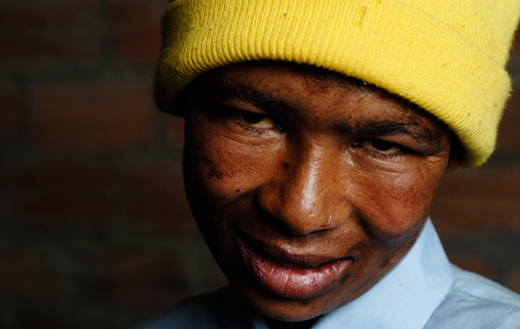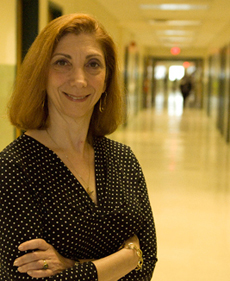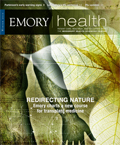Down but not out

by Kay Torrance

|
The police found her along the roadside in September, beaten to a pulp. Later, at Grady Memorial Hospital in downtown Atlanta, nurses saw bite marks on her body and the imprint of hands around her neck. It was impossible to tell what this once vibrant, 26-year-old had looked like. Both of her eyes were swollen shut, and bones in her face were fractured. A 30-year veteran nurse at Grady called it the worst case of abuse he had ever seen.
After the woman was patched up and fitted with a neck brace, she was to be discharged. But a counselor heard that she had no other place to go but back to the man who had tried to kill her. That’s when the Grady Nia Project got involved.
Nia team members connected the woman with psychiatric services at the hospital, a domestic violence shelter in the community, and empowerment groups provided by Nia.
Established by Emory psychologist Nadine Kaslow in the early 1990s, Nia is a counseling program for abused and suicidal African American women, which is funded by grants from the CDC and the National Institute of Mental Health. Named for the Kwanzaa term that means "purpose," Nia serves countless numbers of abused women who come through Grady’s emergency department each year. The women, who either feel suicidal or have attempted suicide because of stress associated with violence, come in with black eyes, broken bones, and broken spirits, often inflicted by the people who are supposed to love them the most: their husbands, boyfriends, and partners. These victims of intimate partner violence are usually black, minimally employed, with children, and addicted to drugs and alcohol. Many are homeless.
Early in her career, Kaslow ran head on into the overwhelming challenges these women face when she treated a female patient who later killed herself. This tragic experience led her to want to help traumatized women, to pull them out of the hopelessness that had made them consider ending their lives. At Grady, when she counseled women who had attempted suicide, she found that many of them were involved in an abusive relationship. She also discovered that low-income, African American women faced more than their fair share of hardships, including racism and oppression, and were at increased risk of suicidal behavior.
In fact, studies have shown that abused African American women attempt suicide at more than double the rate of women of other races. Moreover, if they leave a relationship, their communities often discriminate against them.
Kaslow wanted to do something to change these scenarios, but she knew that any program would need to be grounded in the women’s culture and extend beyond one-on-one counseling to work. The program she developed is based on an empowerment group therapy model. The group becomes the women’s support system—a key to success for women attempting to leave abusive relationships, Kaslow says, because a woman’s family and friends often give up on her after repeated attempts to leave have failed.
"Community" is especially important to African American women, Kaslow says. Historically, they have relied on each other. And because of distrust of the police and the courts, abused black women are less likely than their white peers to seek help from such institutions.
"Many of them are afraid to leave," Kaslow says. "They are making tough choices—getting out versus living on the street."
Nia staff are on-call 24/7, often making a trip to the emergency department in the middle of the night when a woman comes in with injuries or a story consistent with intimate partner violence or when she has attempted suicide. If a woman enrolls in the program, she will join approximately 50 to 75 other women who are going through it at any given time. (A separate group meets for women who have attempted suicide.)
The Nia leaders handle a whole host of issues. They discuss how to secure resources from community agencies. They pick up women who have been evicted, help them find shelter (some shelters for abused women won’t admit the women’s adolescent sons), get their utilities turned on, and help them enroll in addiction treatment or work readiness programs.
One essential topic the group sessions cover is developing a safety plan. The plan starts with moving an argument out of the kitchen, if it begins there, and de-escalating physical, sexual, or psychological abuse. Women are advised to keep relevant papers outside of the home for easier access and a stash of money or MARTA tokens in case they need to leave quickly. Once a decision is made to leave, a woman often has very little time to gather her things and flee to safety (sometimes with her children). The Nia groups help women think through a plan before they need it: who they can turn to for support, how they can find safety.
One of the earliest women to go through Nia was functionally illiterate, Kaslow remembers. "We helped her get into an adult literacy program. She was so thrilled when she completed it. She came into the office and read every word of the certificate to us. She said she could now go to the grocery store and pick out the can of soup she wanted. Before, she just picked one, not knowing what it was."
Nia is different from other programs for abused women in that it never terminates a woman from the program. Some programs kick out women if they go back to their abusers or have a drug or alcohol problem. "Doing that can often guarantee a woman will go back to the abuser," says Kaslow. "The average number of times it takes a woman to leave her abuser is 10. It’s a very slow process, and that’s one of the things I’ve learned to accept more over time."
On a more positive note, the women who participate in Nia have made some progress over time. They feel more positive about themselves and better able to cope with stress. They feel less depressed, anxious, and suicidal. Some remain in the program for years, and others stop by when they need extra support and guidance. EH
The Nia Project helps women who are trying to break free from intimate partner abuse. If you or someone you know needs help, contact 404-616-2897 or see psychiatry.emory.edu/PROGRAMS/niaproject/home.htm.


